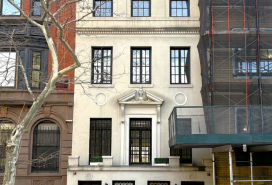6 reasons it's easier than you think to buy a NYC apartment

Between sticker shock, competition from local and international buyers, and a sea of often-contradictory tips floating around, jumping into the New York City real estate market for the first time can feel overwhelming, if not downright impossible, even if you've lived in the city for years.
Whether you're a longtime New Yorker looking to make the move from renting to buying, or you're brand new to the city, Citi Habitats agents—and some real-life first-time buyers—share some tricks of the trade that'll land you your own slice of the city in no time:
1. The down payment isn't always as big as you think
Many would-be buyers are understandably spooked by the 20 percent figure that's often cited as the standard NYC down payment.
"Buyers think they have to come up with $100,000 to buy a $500,000 apartment"--20 percent down (or more) plus broker fees, lawyer fees, and other assorted closing costs--"and that's just not the case," says Citi Habitats agent Jason Warner.
In reality, however, there are quite a few apartments for sale that require much smaller down payments, meaning you can buy with much less cash on hand.
Lower-priced apartments (say, under the $500K mark) and apartments in less in-demand neighborhoods may have more flexible terms. "Ten percent is the norm, but some places you can get in for as little as five percent down," Warner says. "You’re not going to buy a Park Avenue co-op for $400K but there are plenty of neighborhoods in Brooklyn or Queens where there are some real opportunities to buy a place for the same monthly cost as what you're paying in rent."
"There are also FHA Loans and SONYMA loans, and some banks have special programs for first-time buyers [that allow for lower percentage down payments]," says Janis Irish, who recently learned about these options in the process of buying a Brooklyn townhouse with her sister through Citi Habitats, though she wound up taking out a more standard mortgage. "Do your research, and look into all the different options—don't think you just have to put down 20 percent."
2. Affordable apartments are still out there if you're flexible
Even as much of the Brooklyn market hits sky-high prices, there are still plenty of deals to be found in the outer boroughs, and even in pockets of Manhattan. The key is figuring out what you're willing to compromise on.
"First-time Brooklyn buyers, for instance, often want the front yard, the limestone, etc." says Citi Habitats agent Jamaal Davis, who helped Irish (above) and her sister find their Brooklyn townhouse. "So if you want that at a certain price, you have to compromise. With Janis and her sister, we decided to look in Ocean Hill instead of Bed-Stuy, and to go two or three more subway stops in to see what we could find. Lo and behold, we found a townhouse on a tree-lined block, at a lower price point of $725,000, as opposed to their initial $1.2 million budget. It was a three-family, as opposed to the two-family homes we had been looking at."
Within Manhattan, Citi Habitats agent Caroline Bass notes that there are still deals to be found on the Upper East Side (particularly farther east, in Yorkville), as well as farther uptown in Washington Heights and Inwood. "I was just with clients that were looking for a slightly larger apartment uptown—we saw a three-bedroom up there for around $800,000," she says. "And people underestimate the amount of amenities uptown."
Downtown, Citi Habitats agent Corlie Ohl recommends Two Bridges, the area in between the Lower East Side and Chinatown, noting, "A lot of landlords are going in and renovating these buildings, and it's so close to the F train." If you're willing to have a longer walk from the subway, Alphabet City is also a more affordable alternative to the East Village, she notes, and once the L train shutdown takes hold, there will likely be deals to be found in Williamsburg, as well.
No matter what corner of the city you're searching in, expanding your boundaries can be key.
"I was working with a pair of buyers moving in from California, who were set on buying on the Upper West Side," says Citi Habitats agent Susan Raskin-DiLeo. "But then they found an amazing, larger place on 72nd and First Avenue with open views, a recent renovation, and extras like a built-in sound system, which they never would have landed on without being willing to compromise on location."
If you're working with a knowledgeable agent, they can help assess your budget and your wish list, and figure out where there's wiggle room, and which factors are non-negotiable. "Don't fixate on a certain neighborhood, or block, or type of house," advises Irish, who ended up purchasing the Ocean Hill house. "Be open, because you never know where you'll find that perfect gem. Often, it's more about what you're paying for what you're getting than it is about the exact location."
3. Your total monthly costs can be lower than your rent
If you've been shelling out for a pricey rental, your monthly outlay on mortgage payments shouldn't end up costing you much more than what you're currently paying your landlord, if you're buying at the right pricepoint for you.
"I always tell my clients that we'll try to stay consistent with their current rent amount," says Citi Habitats broker Josh Thissell. "This is one of the most expensive cities in the country to rent in, so that's very plausible."
To figure out what price point you can buy in that would allow for mortgage payments roughly equivalent to your current rent, play around with an online mortgage calculator, and have a frank conversation with your broker.
"Once you write that first big check, it's really the same as paying rent," says Warner.
And if you're buying in a new construction or condo building, there's a good chance the cost of certain repairs in the apartment will be covered by the developer, not by you. "People often think that buying an apartment is like buying a house, where they're on the hook for every little leak, etc., that goes wrong, and that's just not the case," Warner explains. "Many appliances and fixtures may be under warranty for the first few years, depending on the building, and the developer will take care of a lot of it."
4. You don't have to be an expert on every single detail
Between mortgage approvals, board applications, and research into the building itself, buying New York property is a process that involves plenty of paperwork, with complex (but crucial) details in the fine print.
But with your agent, your mortgage broker, and your attorney, you'll also have a team of experts on your side whose exact job is helping you navigate potential pitfalls, and finding the right apartment for you.
"In New York, you have a real estate attorney who's looking out for you, and doing due diligence on the building, making sure you're not buying into a problem," says Raskin-DiLeo. "Then you've got your mortgage broker, who can help assess what you qualify for, and your broker, who's making sure the building will suit your needs."
For this reason, assembling the right team is a key first step in the process.
"Work with someone who's experienced," advises Warner. "If you're looking at co-ops, go with a broker who knows co-ops, or if you're looking at new construction, opt for a broker who knows new construction. And use a New York real estate attorney, not your cousin who does contract law out-of-state."
Once you've found a real estate agent you'd like to work with, they can also give you their go-to recommendations of dependable attorneys and lenders so you're not relying solely on the suggestions of, say, Yelp reviews.
5. Co-ops are a first-time buyer's best friend
While co-ops have a reputation for tough requirements and even tougher board interviews, they're often surprisingly accessible for first time buyers.
"For your average first-time buyer, the price point on co-ops is much more in the realm of what's reasonable," says Raskin-DiLeo. "There's nothing to be afraid of with a co-op."
A co-op building will require quite a bit of paperwork, but not necessarily much more than you'd need for the ever-more-complicated process of applying for a rental these days. (Think reference letters, proof of income tax, a proof of employment letter, etc.) And it's your broker's job to help you prepare all these materials and put your best foot forward, first on paper, and later, in person.
"At the majority of co-ops, these stereotypes about the board interviews being so intrusive and difficult aren't true," adds Bass. "They just want to make sure you're a conscientious neighbor and can pay your maintenance. Ninety-nine percent of the time, by the time clients get to the board interview, it's really just a meet and greet to say hi and put a face to a name."
Go in with a positive mindset and don't go overboard on questioning the board about the building, and your interview process should be a breeze.
6. It's easier to get a mortgage these days
Just as there are a number of ways to buy with a lower down payment, financing options are getting more flexible all the time.
"Banks have loosened up a little bit, so it's easier now to get a mortgage that it was, say, five years ago," says Warner. And, as Davis points out, things you might think make you a no-go on paper won't necessarily put the kibosh on your loan. "For instance, if you have pretty good credit but not a long credit history, that's not necessarily a dealbreaker," he explains. "It's more favorable to the banks if you have less credit and less debt than the other way around."
If you're interested in dipping a toe in, Thissell recommends getting recommendations for lenders from anyone you know who's purchased in New York. "They all have a mortgage broker or banker—you should get a name or number from every single one of them," he suggests. "A good mortgage broker can tell you what you qualify for, and some I work with will help you come up with a plan to get to a point where you can purchase and qualify for financing within the next two to four years."
Citi Habitats is a full-service residential real estate brokerage whose agents have been guiding New Yorkers for over 20 years. With nine offices across Manhattan and Brooklyn, Citi Habitats continues to evolve. The firm is reshaping the city’s real estate landscape, while creating infinite ways to live. Always. Find your new home at CitiHabitats.com.
Real estate agents affiliated with Citi Habitats are independent contractor sales associates and are not employees of Citi Habitats. Citi Habitats is a licensed real estate broker located at 387 Park Avenue South, NY, NY 10016. Equal housing opportunity.























